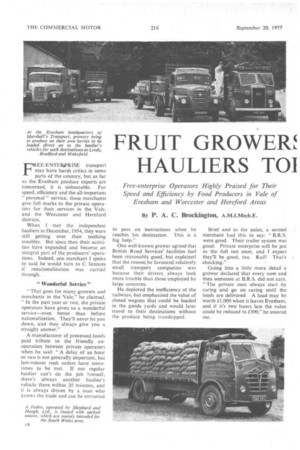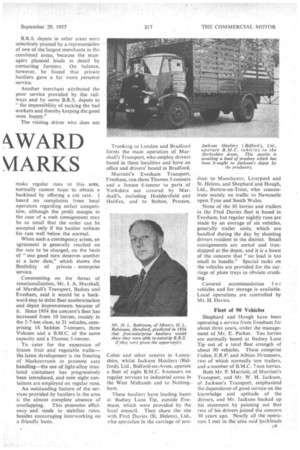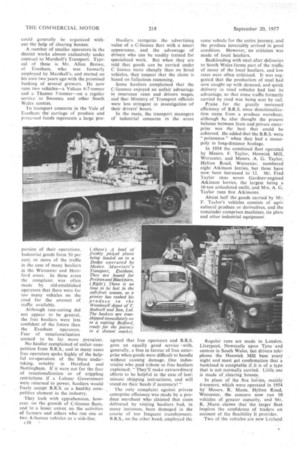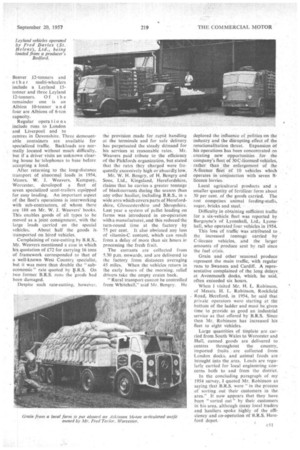FRUIT GROWER!
Page 48

Page 49

Page 50

Page 51

If you've noticed an error in this article please click here to report it so we can fix it.
HAULIERS TOI &WARD MARKS
By P. A. C. Brockington, A.M.I.Mech.E. FREE-ENTER•PRISE transport may have harsh critics in some parts of the country, but as far as the Evesham produce experts are concerned, it is unbeatable. For speed, efficiency and the all-important
personal" service, these merchants give full marks to the private operators for their services in the Vale, and the Worcester and Hereford districts.
When I met the independent hauliers in December, 1954, they were still getting over their teething troubles. But since then their activities have expanded and become an integral part of the producers' operations. Indeed, one merchant I spoke to said he would turn to C licences if renationalization was carried through.
"Wonderful Service"
"That goes for Many growers and merchants in the Vale," he claimed.
In the past year or two, the private operators have given us a wonderful service—even better than before nationalization. They'll never let you down, and they always give you a straight answer."
A manufacturer of processed foods paid tribute to the friendly cooperation between private operators when he said: "A delay of an hour or two is not generally important, but last-minute rush orders have sometimes to be met. If our regular haulier can't do the job himself, there's always another haulier's vehicle there within 30 minutes, and it is always driven by a man who knows the trade and can be entrusted to pass on instructions when he reaches his destination. This is a big help."
One well-known grower agreed that British Road Services' facilities had been reasonably good, but explained that the reasorthe favoured relatively small transport companies was because their drivers always took more trouble than those employed by large concerns.
He deplored the inefficiency of the railways, but emphasized the value of closed wagons that could be loaded in the goods yards and would later travel to their destinations without the produce being transhipped. Brief and to the point, a second merchant had this to say: " B.R.S. were good. Their trailer system was good. Private enterprise will be put to the full test soon, and I expect they'll be good, too. Rail'? That's shocking."
Going into a little more detail a grower declared that every now and then someone at B.R.S. did not care. "The private men always start by caring and go on caring until the loads are delivered. A load may be worth £1,000 when it leaves Evesham, and if it's two hours late the value could be reduced to £300," he assured me.
B.R.S. depots in other areas were selectively praised by a representative of one of the largest merchants in the combined areas, because the managers planned loads in detail by contacting farmers. On balance, however, he found that private hauliers gave a far more personal service.
Another merchant attributed the poor service provided by the railways and by some B.R.S. depots to "the impossibility of sacking the bad workers and thereby keeping the good ones happy."
The visiting driver who does not
make regular runs to this area, normally. cannot hope -to obtain a backload by offering a cut rate. I heard no complaints from local operators regarding unfair competition, although the profit margin in the case of a rush consignment may be so small that the order can be accepted only if the haulier reduces his rate well below the normal.
When such a contingency arises, an agreement is generally reached on the rate to be charged, on the basis of "one good turn deserves another at a later date," which shows the flexibility of private enterprise service.
Commenting on the threat of renationalization, Mr. J. A. Marshall, of Marshall's Transport, Badsey and Evesham, said it would be a backward step to defer fleet modernization and depot improvements because of it. Since 1954 the concern's fleet has increased from 10 lorries, mainly in the 5-7-ton class, to 21 vehicles, comprising 16 Seddon 7-tonners, three Vulcans and a B.M.C. of the same capacity and a Thames 5-tonner.
To cater for the expansion of frozen fruit and vegetable traffic— the latest development is the freezing of blackcurrants to promote easy handling—the use of light-alloy insulated containers has progressively been introduced, and now eight containers are employed on regular runs.
An outstanding feature of the services provided by hauliers in the area is the almost complete absence of
overlapping, This promotes efficiency and tends to stabilize rates, besides encouraging interworking on a friendly basis.
Trunking to London and Bradford forms the main operation of Marshall's Transport, who employ drivers based in these localities and have an office and drivers' hostel. in Bradford.
Marriott's Evesham Transport, Evesham, run three Thames 5-tormers • and a Jensen 6-tonner to parts of Yorkshire not covered by Marshall's, including Huddersfield and Halifax, and to Bolton, Preston, Coln e and other centres in Lancashire, whilst Jackson Hauliers (Bidford), Ltd., Bidford-on-Avon, operate a fleet of eight B.M.C. 8-tonners on regular services to industrial areas in the West Midlands and to Notting-ham.
These hauliers have loading bases at Badsey Lane Tip, outside Evesham, which were provided by the local council. They share the site with Fred Davies (St. Helens), Ltd., who specialize in the carriage of pro due.e to Manchester, Liverpool and St. Helens, and Shephard and Hough, Ltd., Burton-on-Trent, who concentrate mainly on traffic to Newcastle upon Tyne and South Wales.
None of the 30 lorries and trailers in the Fred Davies fleet is based in Evesham, but regular nightly runs are made by an average of six vehicles, generally trailer units, . which are handled during the day by shunting drivers resident in the district. Small consignments are sorted and transhipped at the depot, and it is a boast of the concern that "no load is too small to handle." Special racks on the vehicles are provided for the carriage of plum trays to obviate crushing.
Covered accommodation f o r vehicles and for storage is available. Local operations .are controlled by Mr. H. Davies.
Fleet of 90 Vehicles
Shephard and Hough have been operating a service from Evesham for about three years, under the management of Mr. E. Parker. Ten lorries are normally based at Badsey Lane Tip out of a total fleet strength of about 90 vehicles. These comprise Foden, E.R.F. and Albion 10-tonners, two of which normally tow trailers, and a number of I3.M.C. 7-ton lorries.
Both Mr. P. Marriott, of Marriott's Transport, and Mr. W. H. Jackson, of Jackson's Transport, emphasized the dependence of good service on the knowledge and aptitude of the drivers, and Mr. Jackson backed up his statement by pointing out that two of his drivers joined the concern 30 years ago. Nearly all the operators I met in the area said backloads
could generally be organized without the help of clearing houses.
A number of smaller operators in the district works almost exclusively under contract to Marshall's Transport. Typical of these is Mr. Allan Brown, of Evesham, who was formerly employed by Marshall's, and started on his own two years ago with the promised backing of several growers. He now runs two vehicles—a Vulcan 6-7-torner and a Thames 5-tonner—on a regular service to Swansea and other South Wales centres.
To transport concerns in the Vale of Eveshain the carriage of produCe and processed foods represents a large pro portion of their operations. Industrial goods form 50 per cent. or more of the traffic in the case of many hauliers in the Worcester and Hereford areas. In these areas the complaint was often made by old-established operators that there were far too many vehicles on the road for the amount of traffic available.
_ Although rate-cutting did not appear to be general, the free hauliers were less confident of the future than the Evesham operators. Fear of renationalization seemed to be far more prevalent, No haulier complained of unfair competition from B.R.S., and in many cases free operators spoke highly of the helpful co-operation of the State undertaking. notably in Hereford and Nottingham. If it were not for the fear of renationalization or of crippling restrictions if a Labour Government were returned to power, hauliers would freely accept B.R.S. as a healthy competitive element in the industry.
They look with apprehension, however, on the growth of C-licence fleets, and to a lesser extent on the activities of farmers and others who run one or two A-licence vehicles as a side-line. Hauliers recognize the advertizing value of a C-licence fleet with a smart appearance, and the advantage of drivers who can be readily trained for specialized work. But when they are told that goods can be carried under C licence more cheaply than on hired vehicles, they suspect that the claim is based on fallacious reasoning.
Some hauliers complained -that the C-licensee enjoyed an unfair advantage in insurance rates and drivers wages, and that Ministry of Transport officials were less stringent in investigation of their drivers' hours.
In the main, the transport managers of industrial concerns in the areas agreed that free operators and B.R.S. gave an equally good service •with, generally, a bias in favour of free enterprise when goods were difficult to handle without causing damage. One industrialist who paid tribute to free hauliers explained: "They'll make extraordinary efforts to be helpful in the case of lastminute shipping instructions, and will stand on their heads if necessary! "
The only complaint against private enterprise efficiency was made by a produce merchant who claimed that cases delivered by visiting hauliers had, in many instances, been damaged in the course of too frequent transhipment. B.R.S., on the other hand, employed the same vehicle for the entire journey, and the produce invariably arrived in good condition. However, no 'criticism was made of local hauliers.
Backloading with steel after deliveries to South Wales forms part of the traffic of many of the local hauliers, and low rates were often criticized. It was suggested that the production of steel had now caught up with demand, and quick delivery in road vehicles had lost its advantage, so that some traffic formerly carried by road was being sent by rail.
Praise for the greatly increased efficiency of B.R.S. since denationalization came from a produce merchant, although he also thought the present balance between State and private enterprise was the best that could be achieved. He added that the B.R.S. were "poisonous" when they had a monopoly in long-distance haulage.
In 1954 the combined fleet operated by Messrs. F. Taylor, Henwick Mill, Worcester, and Messrs. A. G. Taylor. Hylton Road, Worcester, numbered eight Atkinson lorries, but these have now been increased to 12. Mr. Fred Taylor runs seven Gardner-engined Atkinson lorries, the largest being a 16-ton articulated outfit, and Mrs. A. G. Taylor runs five Atkinsons.
About half the goods carried by Mr. F. Taylor's vehicles consists of agricultural produce or derivatives, and the remainder comprises Machines, tin plate and other industrial equipment Regular runs are made to London, Liverpool. Newcastle upon Tyne and centres in South Wales, but drivers telephone the Henwick Mill base every night and must get confirmation that a backload is acceptable if it is of a type that is not normally carried. Little, use is made of clearing houses.
In place of the five lorries, mainly 6-tonners. which were operated in 1954 by Messrs. R. Mann, Hylton Road, Worcester, the concern now run 10 vehicles of greater capacity, and Mr. R. Mann claims that the larger fleet inspires the confidence of traders on account of the flexibility it provides.
Two of the vehicles are new Leyland Beaver 12-tonners and
other multi-wheelers include a Leyland 15tonner and three Leyland 12-tonners. Of the remainder one is an Albion 10-tonner -a n d four are Albions of 6-ton capacity.
Regular opera tions include runs to London and Liverpool and to centres in Devonshire. Three demountable containers are available for specialized traffic. Backloads are normally located without much difficulty. but if a driver visits an unknown clearing house he 'telephones to base before accepting a load.
After returning to the long-distance transport of abnormal loads in 1954, Messrs. W. J. Weavers, Keinpsey, Worcester, developed a fleet of seven specialized semi-trailers equipped for easy loading. An important aspect of the fleet's operations is interworking with sub-contractors, of whom there are 188 on Mr. W. 1. Weavers' books. This enables goods of all types to be moved as a joint consignment, with the large loads carried on the special vehicles. About half the goods is. transported on hired vehicles.
Complaining of rate-cutting by I3.R.S., Mr. Weavers mentioned a case in which his quotation of £72 for carrying 16 tons of framework corresponded to that of a well-known West Country specialist, but it was more than double the " sub economic " rate quotedby kl.R.S. On two former B.R.S. runs the goods had been damaged.
Despite such rate-cutting, howeVec, the provision made for rapid handling at the terminals and for safe delivery has perpetuated the steady demand for his services at reasonable rates. Mr. Weavers paid tribute to the efficiency of the Pickfords organization, but stated that the rates they charged were frequently excessively high or absurdly low.
Mr. W. R. Bengry, of H. Bengry and Sons, Ltd., Kingsland, Herefordshire, claims that he carries a greater tonnage of blackcurrants during the season than any other haulier, including B.R.S., in a wide area which covers parts of Herefordshire, Gloucestershire and Shropshire. Last year a system of pallet loading on farms was introduced in co-operation with a manufacturer, and this reduced the turn-round time at the factory by 75 per cent. It also obviated any loss of vitamin-C content, which can result from a delay of more than six hours in processing the fresh fruit.
The currants are collected from 5.30 p.m. onwards, and are delivered to the factory from distances averaging 45 miles. When the vehicles return in the early hours of the morning, relief drivers take the empty crates back.
"Rural transport cannot be controlled from Whitehall," said Mr. Bengry. I-le deplored the influence of politics on the industry and the diSrupting effect of the renationallzation threat. Expansion of his operations has been concentrated on creating new opportunities for the company's fleet of 30C-licensed vehicles, rather than . the enlargement of the A-licence fleet of 10 vehicles which operates in conjunction with seven Blicence lorries.
Local agricultural products and a smaller quantity of fertilizer form about 30 per cent of the goods carried. The rest comprises animal feeding-stuffs, sugar, bricks and steel.
Difficulty in obtaining sufficient traffic for a six-vehicle fleet was reported by Burgoyne's of Lyonshall, Ltd., Lyonshall, who operated four vehicles in 1954.
This loss of traffic was attributed to the increased tonnage carried by C-licence vehicles, and the larger amounts of produce sent by rail since the fuel crisis.
Grain and other "seasonal produce represent the main traffic, with regular runs to Swansea and Cardiff. A representative complained of the long delays at Avonmouth docks, which, he said, often exceeded six hours.
When I visited Mr. H. L. Robinson, of Messrs. H. L. Robinson, Rockfteld Road,. Hereford, in 1954, he said that private operators were starting at the bottom of the ladder and must be given time to 'provide as good an industrial service as that offered by B.R.S. Since then Mr. Robinson has increased his fleet to eight vehicles.
Large quantities of tinplate are carried from South Wales to Worcester and Hull, canned goods are delivered to centres throughout the country, imported fruits are collected from London docks, and animal foods are brought into the area. Loads are regularly carried for local engineering concerns both to and from the district.
In the concluding paragraph of my 1954 survey, I quoted Mr. Robinson as saying that B.R.S. were " in the process of sorting out their customers in the area." It now appears that they have been " sorted out" by their customers in his area, although many local traders and hauliers spoke highly of the efficiency and co-operation of B.R.S. Hereford depot.
















































































































